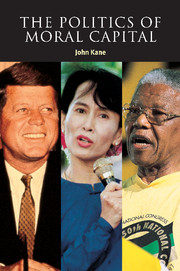Part I - Moral capital
Published online by Cambridge University Press: 22 September 2009
Summary
The term “capital” has been extended beyond its traditional economic usages on several occasions in recent years. The idea of human capital, for instance, has been advanced to encompass those natural and acquired skills and abilities individuals may utilize in pursuing a career, or that firms and nations may employ en masse for their profit or development. Because of the central role of knowledge and information in modern economies, some writers point to the importance of intellectual capital as the key to the future success of businesses. Then there is the well-known concept of social capital postulated by Robert Putnam to capture theoretically the social networks of trust that individuals form and which allegedly serve quite broad and beneficial functions. Social capital has been argued, for instance, to be an important determinant of a person's ability to progress upward in a job and to obtain higher rates of pay, and been used to hypothesize significant effects that the “social glue” characteristic of particular societies (the relative tightness and robustness of their social institutions) may have on their political and economic health.
Whatever the merits or otherwise of these postulates, the idea is generally the same: things valuable or pleasurable in themselves – people, knowledge, skills, social relationships – can also be resources that enable the achievement of other social, political or economic ends. The presumption is that people, corporations and societies that develop these forms of capital possess investable resources capable of providing tangible returns.
- Type
- Chapter
- Information
- The Politics of Moral Capital , pp. 5 - 9Publisher: Cambridge University PressPrint publication year: 2001

